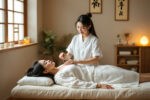When it comes to starting a family, the journey isn’t always straightforward. For many, fertility treatments like in vitro fertilization (IVF) become a beacon of hope. But what if there were a way to enhance this process naturally? Enter acupuncture—a time-honored practice that’s gaining traction in the modern world of reproductive medicine. This article dives deep into how acupuncture and IVF can work hand-in-hand, offering a holistic boost to those dreaming of parenthood. If you’re curious about this integrative approach, check out this detailed guide on acupuncture and ivf to see how it might fit into your fertility plan.
The road to conception can feel like an emotional rollercoaster, filled with highs of hope and lows of uncertainty. Traditional fertility methods are incredible, but they often focus solely on the physical. That’s where complementary therapies step in, bridging the gap between body and mind. By exploring how ancient techniques pair with cutting-edge science, we’ll uncover a path that’s as nurturing as it is effective.
The Science Behind Acupuncture
A Brief History of an Ancient Art
Acupuncture has roots stretching back over 2,000 years, originating in China as a cornerstone of Traditional Chinese Medicine (TCM). Practitioners insert thin needles into specific points on the body, known as meridians, to balance energy flow—or “qi.” While it might sound mystical, modern research is starting to decode how this practice impacts our physiology, making it a fascinating ally for fertility.
How It Works in the Body
At its core, acupuncture stimulates the nervous system. When needles pierce the skin, they trigger responses that release endorphins, reduce inflammation, and improve blood circulation. For women undergoing IVF, this can mean better blood flow to the uterus and ovaries—key players in conception. Studies suggest this increased circulation might create a more welcoming environment for embryo implantation, a critical step in the IVF process.
IVF: A Modern Miracle
Understanding the IVF Journey
In vitro fertilization is a marvel of modern medicine. It involves retrieving eggs, fertilizing them with sperm in a lab, and transferring the resulting embryos into the uterus. While it’s a powerful tool, success rates hover around 30-40% per cycle, depending on age and other factors. Stress, hormone imbalances, and even subtle uterine conditions can tip the scales, which is why many are turning to supportive therapies.
The Emotional and Physical Toll
IVF isn’t just a physical endeavor—it’s an emotional marathon. The injections, the waiting, the two-week limbo before a pregnancy test—it’s a lot. Many patients report feeling drained, anxious, or disconnected. This is where a holistic approach can shine, offering not just physical support but a way to soothe the soul.
Blending Tradition with Technology
Why Pair Acupuncture with IVF?
Combining acupuncture with IVF isn’t about replacing science—it’s about enhancing it. Think of it like adding a co-pilot to your flight crew. Acupuncture can reduce stress hormones like cortisol, which can interfere with reproductive processes. By calming the nervous system, it creates a more balanced state for the body to welcome new life.
Timing Matters: When to Start
Most experts recommend beginning acupuncture sessions a few months before an IVF cycle. This prep phase can regulate menstrual cycles, boost egg quality, and ease anxiety. During the cycle itself, sessions often align with key moments—like egg retrieval or embryo transfer—to maximize benefits. It’s a tailored rhythm, syncing ancient wisdom with clinical precision.
The Benefits of an Integrative Approach
Boosting Blood Flow and Beyond
One of the standout perks is improved circulation. The uterus needs a rich blood supply to support a growing embryo, and acupuncture’s ability to enhance this flow is a game-changer. Beyond that, it may help balance hormones, reduce inflammation, and even improve sperm quality for male partners—an often-overlooked piece of the fertility puzzle.
Easing the Mind
Let’s not underestimate the power of peace. IVF can feel like a pressure cooker, and chronic stress can disrupt the delicate dance of hormones needed for success. Acupuncture offers a reset button, helping patients feel grounded and present. It’s not just about the needles—it’s about carving out a space to breathe.
Real Stories, Real Results
Voices from the Journey
Take Sarah, a 34-year-old teacher who’d faced three failed IVF cycles. Frustrated but determined, she added acupuncture to her fourth attempt. “I felt calmer, more in control,” she recalls. That cycle, she conceived twins. While not every story ends this way, anecdotes like Sarah’s highlight the potential of this duo. Clinics worldwide are noting similar trends, with patients reporting less stress and, in some cases, better outcomes.
What the Research Says
Science is catching up too. A 2019 study found that women who used acupuncture alongside IVF had higher pregnancy rates compared to those who didn’t. Another review pointed to improved live birth rates, though researchers call for larger trials. It’s not a magic bullet, but the evidence is promising enough to warrant a closer look.
What to Expect in a Session
Your First Visit
Walking into an acupuncture clinic can feel like stepping into a sanctuary. You’ll start with a consultation—expect questions about your cycle, stress levels, and IVF plan. The practitioner will then map out a treatment, targeting points like the lower abdomen or wrists. The needles? Barely a pinch, and many find the session deeply relaxing.
Building a Routine
Consistency is key. Weekly sessions are common, ramping up to twice weekly during an IVF cycle. Each visit lasts about 30-60 minutes, often with dim lights and soft music. It’s less about enduring and more about unwinding—a rare treat in the fertility grind.
Choosing the Right Practitioner
Credentials and Comfort
Not all acupuncturists are created equal. Look for someone certified in TCM or reproductive health, ideally with experience in fertility cases. Ask about their approach—do they collaborate with IVF clinics? Feeling at ease with them is just as important as their résumé.
Questions to Ask
Before booking, inquire about their success stories, session costs, and how they tailor treatments. A good practitioner will listen as much as they advise, ensuring your unique needs shape the plan. Trust your gut—if it feels right, you’re on the right track.
Beyond the Needles: Lifestyle Synergy
Nutrition and Movement
Acupuncture doesn’t work in a vacuum. Pair it with a diet rich in antioxidants—think berries, leafy greens, and healthy fats—to support egg and sperm health. Gentle exercise like yoga or walking can amplify the benefits, keeping stress at bay and energy flowing.
Mindfulness Matters
Meditation or journaling can deepen the calm acupuncture brings. Even five minutes a day of deep breathing can shift your mindset, making the IVF process less daunting. It’s about building a toolkit where every piece supports the others.
A Personal Investment
Time and Cost Considerations
This path requires commitment. Sessions might cost $75-$150 each, depending on location, and insurance coverage varies. Factor in time too—between IVF appointments and acupuncture, your schedule will fill up. But for many, the investment feels worth it when they hold that positive test.
Weighing the Rewards
It’s not just about numbers—it’s about feeling empowered. Whether it boosts your odds or simply makes the journey kinder, this blend offers something science alone can’t: a sense of agency. For those facing the unknown, that’s priceless.
The Future of Fertility Care
A Growing Trend
Integrative fertility is on the rise. Clinics are partnering with acupuncturists, and patients are driving demand for holistic options. As research expands, we might see this duo become standard practice, reshaping how we approach conception.
Hope on the Horizon
For now, it’s a personal choice—one that blends the best of both worlds. Acupuncture and IVF together offer a bridge between past and present, a reminder that sometimes the oldest tools can light the way to the newest dreams. If you’re considering this path, it’s a step toward not just parenthood, but a more balanced you.
Frequently Asked Questions (FAQs)
1. What is the main benefit of combining holistic practices with fertility treatments?
The primary advantage is reducing stress and enhancing physical conditions like blood flow, which can support the body during complex procedures.
2. How long should I try integrative therapies before expecting results?
Most experts suggest a trial period of 2-3 months to see noticeable changes, though this varies by individual.
3. Can men benefit from needle-based therapies too?
Yes, these treatments can improve sperm quality and reduce stress, making them valuable for male partners as well.
4. Are there risks to starting complementary treatments during a fertility cycle?
When done by a qualified professional, risks are minimal, but always consult your doctor to ensure compatibility with your plan.
5. How do I find a practitioner experienced in reproductive health?
Look for certifications in Traditional Chinese Medicine and ask about their track record with fertility patients.
6. What’s the typical cost of a session?
Prices range from $75 to $150, depending on location and expertise, with some offering package deals.
7. Can diet really impact my fertility journey?
Absolutely—nutrient-rich foods can boost egg and sperm health, complementing other therapies.
8. Is there an ideal time to start holistic treatments?
Starting a few months before a cycle allows your body to adjust, though benefits can still emerge mid-process.
9. How does stress affect fertility success?
High stress levels can disrupt hormones, potentially lowering the chances of conception.
10. Are integrative methods widely accepted by doctors?
Many fertility specialists now support these approaches, especially as research grows, though opinions vary.


